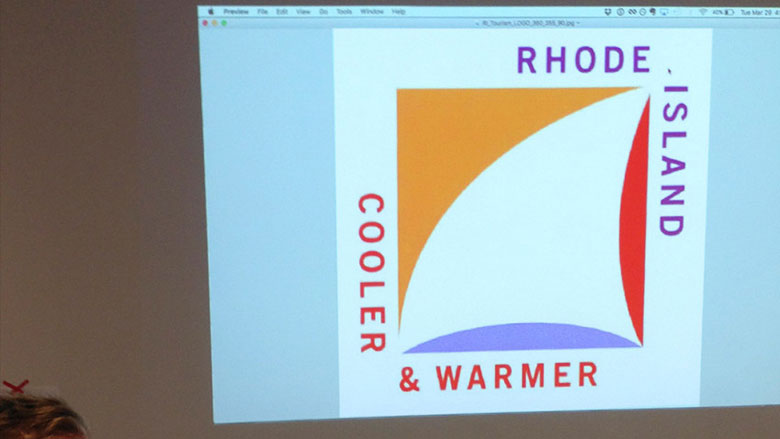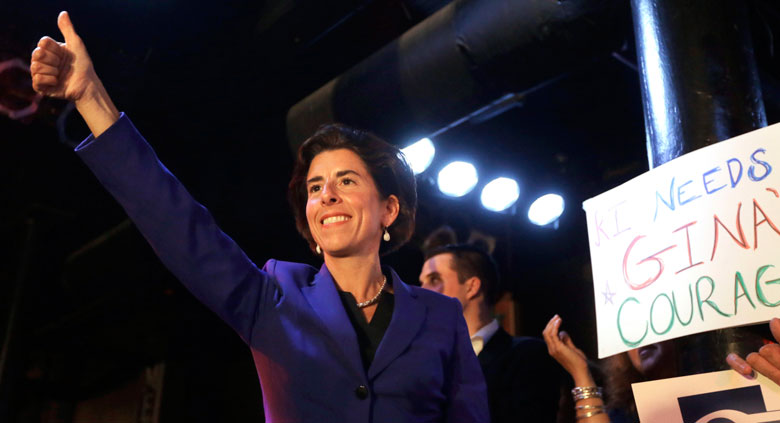‘Cooler and Warmer’ sets the tone for economic development in Rhode Island
By Justin Katz | April 13, 2016, 6:22 EDT
 (AP photo from the release of the new Rhode Island logo)
(AP photo from the release of the new Rhode Island logo) The administration of Rhode Island’s Democrat Governor Gina Raimondo was in for a shock on Thursday, March 28, when it unveiled a new logo and slogan for the Ocean State. The state’s quasi-public Commerce Corporation had been planning the release for months; the ridicule began on social media within minutes of the unveiling.
Mockery of the ambiguous “Cooler and Warmer” tagline and Photoshopped satire with the logo were still sweeping across the local internet when other components of the campaign hit the ground with a thud. Similar mockery of a promotional video scarcely had time to begin before somebody noticed that one clip actually showed a skateboarder in front of a landmark in Iceland. A related website was riddled with errors, including promotion of restaurants across the border in Massachusetts and a well-known chef who had died some time ago.
The administration’s response compounded the marketing failure. The governor initially defended the campaign, chastising Rhode Islanders for being so negative, but the next day she changed her tone to be more receptive to the criticism.
Mockery of Rhode Island’s ambiguous “Cooler and Warmer” marketing campaign swept across the internet, as other components of the campaign hit the ground with a thud.
The shift may have been too little too late, because the incident — relatively minor of itself — too well reflected both Raimondo’s style of leadership and the broader political philosophy that sees government as a sort of corporate board for the region. Put simply, hiring outsiders on the strength of their connections and Ivy League credentials, maneuvering around rules to avoid or subvert local political opposition, and following guidance from supposed experts in New York City and Washington, D.C., might seem to be a savvy strategy for economic development and public policy, generally, but only to the extent that it works … or continues to seem as if it might work.
Promising that he accepted full responsibility (albeit without apparent consequences), Raimondo’s Secretary of Commerce, imported Yale grad Stefan Pryor, promised to learn from his agency’s mistakes. Whatever his intentions, the lesson of the “Cooler and Warmer” flop may be that government shouldn’t attempt to consolidate operations or arrogate to itself the very definition of a society, but rather, should leave that authority to a free and independent population.

Gina Raimondo (Steven Senne, AP)
This pivotal divide is quickly becoming the defining characteristic of the Raimondo administration. Free-marketers, for instance, have been critical of her working with private donors to fund a study by the progressive D.C. Brookings Institution think tank, the results of which Raimondo immediately adopted as the state’s economic development plan. After the “Cooler and Warmer” debacle, Raimondo sounded more as if she was speaking to out-of-state investors than to her constituents when she excused the video’s error by saying that it had been produced by “a local firm,” implying that expectations should be lowered.
An observer can’t help but suspect that Raimondo views her out-of-state elite peers, not her Rhode Island constituents, as her true audience.
An observer can’t help but suspect that Raimondo views her elite peers as her true audience. A few days later, Pryor reinforced this impression when he brushed off a TV news reporter who was pressing him on a question of transparency by asking him to move on with: “What else do you have?” The tone of the secretary’s voice suggested agitation at a small-time reporter’s stubbornness, whereas he should have been exuding respect for his obligation to inform the public.
The matter takes on a more concrete, potentially more corrupt, character in light of the topic on which Pryor refused to answer questions. Despite WPRI reporter Perry Russom’s persistence, Pryor would not give a timeline for the approval of “Cooler and Warmer.” However, during a January 14 hearing, his chief of staff at Commerce had given very specific detail, adding that the administration would hold off on the public unveiling until it could be “timed with other events that are happening.” As it happened, the only events proximate to the ultimate release were a Forbes magazine article featuring Raimondo as one of the world’s top 50 “greatest leaders” and a Glamour magazine interview with her husband, labeling the pair as an up-and-coming “political power couple.”
The timing of Rhode Island’s “Cooler and Warmer” branding campaign suggests it is aimed more at promoting the governor than the Ocean State.
While the unified branding campaign might work well for a self-promoting governor, her in-house experts are now questioning whether it works so well for the state. Among the lessons that Pryor now says his agency has learned was that it was a mistake to insist on a single tagline to capture a geographically diverse state.
The public should insist that the state government must attempt to apply the same lesson to all of the meddling that it does in the name of economic development. An organization that can’t pull off the release of a logo probably shouldn’t be attempting to design an entire economy.

Justin Katz
Justin Katz is research director for the RI Center for Freedom & Prosperity and managing editor of OceanStateCurrent.com. Read his past columns here.










